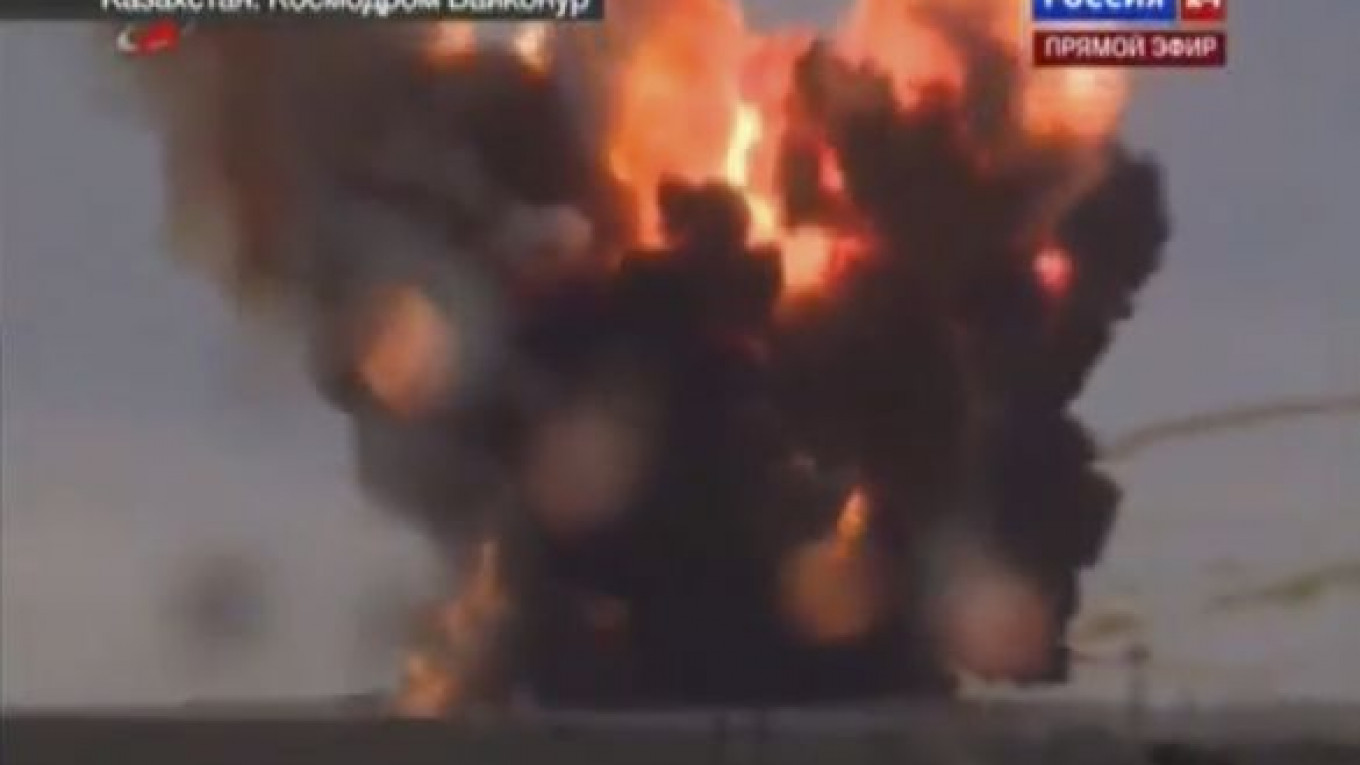Video: An explosion of Proton-M rocket.
A rocket fell apart and hit the ground seconds after lift-off on Tuesday in the latest setback for the Russian space industry.
The Proton-M rocket was carrying three satellites worth about $75 million for the Russian global positioning system, Glonass.
Engulfed in fire and smoke, the debris rained down on earth 2 1/2 kilometers away from the Baikonur launch site, leased by Russia in Kazakhstan, the Federal Space Agency said.
The rocket sharply veered off its course and broke up about 17 seconds into the flight. The space agency, known as Roscosmos, blamed the accident on an emergency switch-off of the engines.
Roscosmos reported no injuries to any personnel, including the launch team, and no damage to the launch site.
The launch team was still housed inside bunkers when the rocket fell, Interfax reported.
But the crash could have caused a large spill of heptyl, a highly toxic fuel. The rocket contained 172 metric tons of the fuel, Kazakh Emergency Situations Minister Vladimir Bozhko said at an emergency government meeting.
Most of the heptyl burned up in mid-air, while rain shortly after the accident alleviated the environmental damage by limiting the spread of the resulting toxic cloud, Kazakh Space Agency chief Talgat Musabayev said.
The Kazakh authorities ordered people in the vicinity of the accident to stay home and keep their windows shut, as well as close stores and eateries.
A commission led by Roscosmos deputy chief Alexander Lopatin is looking into the disaster. The authorities will study its findings to decide whether to suspend further Proton launches, a spokesman for Proton maker Khrunichev Space Center said, Interfax reported.
The three destroyed satellites were worth a total of 2.5 billion rubles, or $75 million, Interfax reported.
Prime Minister Dmitry Medvedev demanded that his deputy, Dmitry Rogozin, name the people responsible for the failure, including top officials at Roscosmos, Cabinet spokeswoman Natalya Timakova said. Medvedev also ordered measures to prevent similar launch accidents.
There may be a two or three month suspension of Proton flights while emergency workers clean up the fuel, a space industry source said, RIA Novosti reported. The source blamed human error for the accident.
“It's about people rather than the rocket. The reason [for the accident] is obviously poor production quality,” the source said.
This is not the first mishap for Proton rockets and Glonass — In 2010, another failed launch destroyed three Glonass satellites, prompting vows from the authorities to straighten out problems in the industry. But a year later, Russia lost a cargo spacecraft, a probe it wanted to send to Mars and two satellites in botched launches.
In the latest accident, a Proton booster, Briz, malfunctioned in December, leading the authorities to suspend launches of the rocket. The ban ended March 26.
Proton rockets are essentially intercontinental ballistic missiles adapted to carry commercial payloads rather than warheads. They used to target the United States during the Cold War.
Several previous accidents with the rockets, which included heptyl spills, strained relations between Russia and Kazakhstan in the past. In September 2007, a Proton rocket crashed near a town in which Kazakh President Nursultan Nazarbayev was making a visit.
Contact the author at [email protected]
Related articles:
A Message from The Moscow Times:
Dear readers,
We are facing unprecedented challenges. Russia's Prosecutor General's Office has designated The Moscow Times as an "undesirable" organization, criminalizing our work and putting our staff at risk of prosecution. This follows our earlier unjust labeling as a "foreign agent."
These actions are direct attempts to silence independent journalism in Russia. The authorities claim our work "discredits the decisions of the Russian leadership." We see things differently: we strive to provide accurate, unbiased reporting on Russia.
We, the journalists of The Moscow Times, refuse to be silenced. But to continue our work, we need your help.
Your support, no matter how small, makes a world of difference. If you can, please support us monthly starting from just $2. It's quick to set up, and every contribution makes a significant impact.
By supporting The Moscow Times, you're defending open, independent journalism in the face of repression. Thank you for standing with us.
Remind me later.


